Community of Service
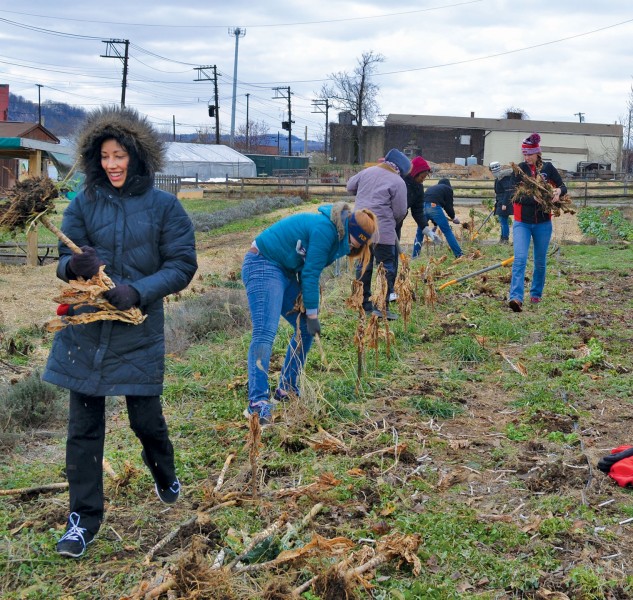
OWU Encourages Students to Give Back Across All Aspects of Campus Life, and That Spirit Is Continued by Many Alumni After Graduation
Kevin Jones ’18 saw all the community service information tables set up in Hamilton-Williams Campus Center most days and decided it was time he got involved. He wasn’t sure where to start, so he did what thousands of students before him have done: He took the elevator to the top of Ham-Wil, then the stairs up to the fourth floor, and headed for the corner.
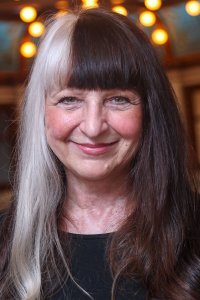
The Community Service Learning Center, occupied by its director, Sally Leber, is windowless and tucked away but bursting with energy and promise, containing resources on the dozens upon dozens of service options available to OWU students, faculty, and staff, and the tools to find new ones.
“Everybody that comes up here wants to do something to make the world better,” Leber says.
Leber’s role is something akin to matchmaker. “Our office is a connector and clearinghouse and resource center. If faculty are looking for service-learning sites, I can help them with curricular needs. When students come in, whether they want to do volunteer work or take what they learned in the classroom and become advocates or activists, we can help them do that,” Leber says.
“What I try to do is listen to them and figure out: How does service fit into their story?”
What I try to do is listen to them and figure out: How does service fit into their story?
director of service learning
Service has been part of the Ohio Wesleyan story since its founding in 1842, when the charter was written to include that the University be, among other aims, “designed for the benefit of our citizens in general.” Placing education in the context of values is a primary OWU objective. That includes equipping students with knowledge and character for leadership and service.
OWU is ranked among the top 20 percent nationally among liberal arts institutions rated by Washington Monthly on the basis of several factors, including “promotion of an ethic of service to country.” OWU received the Presidential Award for Excellence in General Community Service in 2009—the highest honor a school can receive for its commitment to volunteering, service learning, and civic engagement—from the Corporation for National & Community Service (a federal service agency) and has been named to the President’s Higher Education Community Service Honor Roll every year since, including 2015, the most recent recorded, with 1,385 students providing nearly 40,000 hours of community service in a variety of settings and locations.

Across campus, service takes many shapes and forms—from the belly flops performed annually in Meek Aquatics and Recreation Center by Sigma Phi Epsilon fraternity for charity, to debris collected by students, faculty, and staff during the all-campus cleanup annually in April.
Within Delaware and surrounding communities, students work with more than 40 community partners in areas ranging from food insecurity to preventing domestic violence. Suzanne Pingry, program director with Connections Volunteer Center, a program of HelpLine, works with OWU students frequently. “They’ve been super reliable, very interested in giving back to the community and learning about service opportunities,” she says.
In her role as director of clubs and fraternity & sorority life at OWU, Dana Behum works with Greek organizations on the local component of service and/or philanthropy required by the national organizations. “I don’t think people view it as a requirement or obligation. They see service as an opportunity to better themselves. They feel civically responsible to help others,” Behum says.
In addition to each individual organization’s service focus, approximately 300 Greek students turn out each year in October for the Greek Day of Service, which Behum helped launch at OWU in 2013 in conjunction with National Make a Difference Day. Behum coordinates with Pingry to identify nonprofits near campus. In the past students have worked with Lutheran Social Services, Choice Food Pantry, the Delaware County District Library, the Strand Theatre, the Delaware Historical Society, and many other organizations. “The nonprofits are always very thankful for the student’s service, they complement us about the respect the students show and the help they’ve been able to give,” Pingry says.
Behum notes the enthusiasm shown by students, even when doing early morning cleanup at places like Oak Grove Cemetery. “They show up at 8:30 and tell me it’s early, but they’re laughing and do the work. They make it delightful and make it a great joy to give,” Behum says.
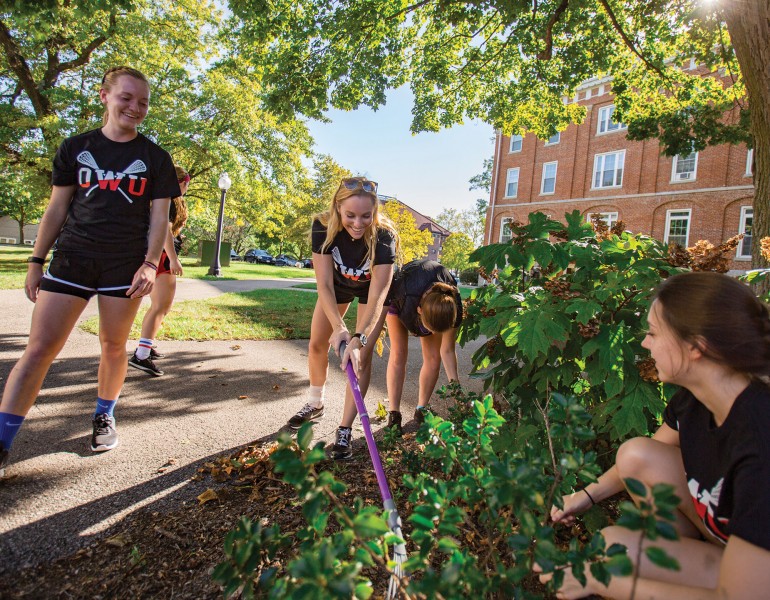
All athletic teams and team members are also expected to participate in community service, a long-standing practice that was initiated by Athletic Director Roger Ingles in 2005. “Giving back to the community is an important aspect of the student-athlete experience at OWU, which not only helps strengthen team bonds, but also enriches the student-athlete and the community,” he says.
This year, the softball team under coach Cassie Cunningham continued its 11-year tradition of work with People in Need Inc. (PIN), which provides emergency services to Delaware residents. The team works a holiday clearinghouse event and delivers food to families. “My kids really like it because they get a chance to meet the families. It’s also during finals and it helps keep the big-picture mentality in mind. It’s a reminder that, yeah, finals are a big deal, but reality is bigger,” Cunningham says.
“The kind of students that come to Wesleyan, and certainly my athletes, are very into serving their community in whatever way they can, whether it’s picking up trash on the way to the field, or the PIN event,” she says.
Off-campus, the University has several long-standing international relationships, including with Pwoje Espwa (Project Hope), an orphanage in Haiti that has hosted students as volunteer coordinators for many years through the connection of alumnus Doug Dittrick ’55, who has been influential in operating the facility. In Tanzania, students have the opportunity to work with the School of St. Jude, thanks to Gordon Smith ’54 and OWU Life Trustee Helen Crider Smith ’56, who support the school. International travel and service are increased areas of emphasis through The OWU Connection, which touts service as a gateway to the world.
Student-led Interfaith Service Teams, previously known as spring-break mission trips, work in communities from Pittsburgh to San Diego each spring (see sidebar). Chad Johns ’02 is an associate chaplain who runs the Interfaith Service Teams program and completed three trips as a student. “OWU students tend to have an ethos of service and social justice that is particular to us; we’re finding a way to feed that,” he says.
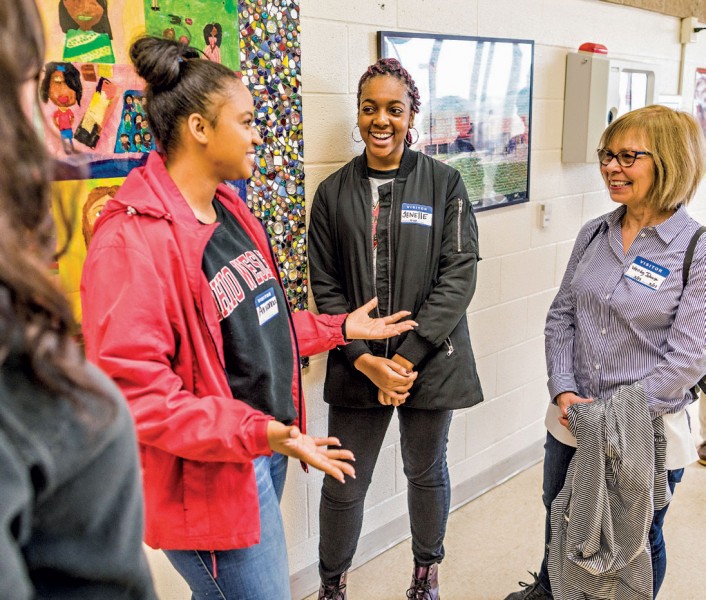
The Columbus Initiative
Leber joined OWU in 1994, and before being appointed director of service learning in 2012 served as director of the Columbus Initiative, an innovative tutoring and mentoring program that is now in its 28th year. Many people know it better as simply “tutoring in Columbus,” but even that doesn’t capture the role that OWU students fill for the pre-kindergarten through sixth-graders at Linden S.T.E.M. Academy three times a week.
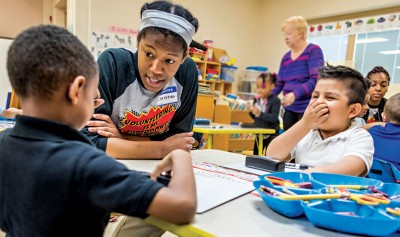
Debra Yetts is the instructional coach for the school, which she describes as “high-poverty, low-achievement” in school improvement status. During her 17 years at Linden, she has seen the impact OWU students have made on the younger kids. “On an individual basis, you see students on that day feeling more valued, feeling more visible,” Yetts says. “The visits really contribute to esteem issues of students and the validation of having one more person smiling at them. On a daily basis, we see it impacting the child.”
Jones has been tutoring once a week at Linden since the start of the school year, and he loves it. “They’re funny, they’re just so sweet and love having people there,” he says.
But he admits that the experience has been eye-opening. “All my school experiences were very different; I’ve never seen a school like this before,” says Jones, who is from Marengo, a village about 20 miles northeast of Delaware with a population of fewer than 350 people.
The OWU visits really contribute to esteem issues of students and the validation of having one more person smiling at them. On a daily basis, we see it impacting the child.
instructional coach at Linden S.T.E.M Academy
Leber describes the longevity of the program as the result of the planning and commitment that go into the visits and the resulting positive effects for all involved. She calls it “hard work and magic.”
Chris Mickens, a sergeant with the Office of Public Safety, started as on-site supervisor with the program last spring. He accompanies the 40 or so students who make the trips each week. Students must go through an interview process with Mickens, during which he explains his standards, including that they simply be present when they are with the children, giving their undivided attention. To that end, before each trip the group meets in the chapel, where Mickens asks them to leave anything else that may be on their mind on campus. “I say that we do tutoring—and mentoring by default,” he says.
“What I find is really awesome about the students I’ve worked with is they’re not just education majors. I see them pulling something from this about how the education system works, about how life works,” Mickens says.
The tutoring is a unique service experience for OWU students because they are also paid for their time, or allowed to access their federal work-study dollars. “It’s a way that students don’t have to choose between doing volunteer service and flipping burgers,” Leber explains.
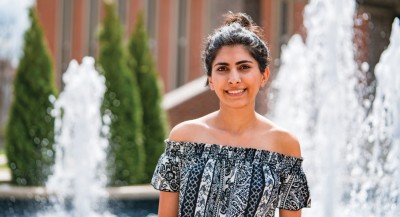
Khadija Salman ’17 has been working with the Columbus Initiative since her freshman year, when Leber connected her with the program. “I love it, I absolutely love it,” Salman says of the tutoring she does twice a week.
“You are working with students who are coming from all different sorts of backgrounds. These kids have seen a lot. You might not be able to relate to them, but you have to be empathetic,” she says. “You have some students that are absolutely brilliant and some students that are absolutely brilliant but refuse to work.”
Salman, an international studies major, hopes to attend graduate school and work at a nonprofit. But first, after graduation in May, she will head to New York City for a school-year teaching position with AmeriCorps, and she expects that her time at Linden will inform her experience. She enthusiastically recommends the tutoring to all OWU students.
Recently, several OWU alumni joined Mickens and Leber to volunteer at Linden. They were brought together by Matt Palmer ’79 through the Columbus Foundation’s Big Table initiative, a day of community-building through hour-long conversations throughout central Ohio that took place on Aug. 30, 2016. Palmer’s group of OWU alumni, faculty, and staff focused on issues in education, and followed up with the University to learn about ongoing volunteer efforts. After learning more through Leber, Farooq Busari ’10 and Wendy McCall Johnson ’74 made the trip to Linden.
Busari, who is on the advisory board for the Woltemade Center, knew about the Columbus Initiative as a student but never had time to get involved. (Among other endeavors, he ran a laundry business and founded a successful nonprofit while a student.) Although he is arguably busier these days as a client executive for government, education, and health care at IBM, and leading the youth and young-adult ministry at his church, (and welcoming a baby daughter April 8) he figured: “It’s never too early or late to start.”
Johnson says that while volunteering wasn’t a priority for her on campus, these days it’s one of her primary focuses. In addition to her extensive volunteer work with OWU, she is a docent at the Columbus Museum of Art and recently hosted the Interfaith Service Team that spent time with a mosque in Columbus. She was impressed by her initial visit to Linden, particularly by the attitudes of the college and elementary students.
“The fact that they are so open and engaged, it made me very hopeful,” she says.
Leber believes another reason for the program’s success is that over nearly three decades, as OWU students have graduated and new ones have signed up, Ohio Wesleyan’s commitment to Linden hasn’t wavered. “It’s had a lasting impact on the Linden community,” she says. ”These kids know that we’re an organization that shows up every year. We say we’re going to come, and we come.”
The long-running program embodies the commitment to service across campus that is second nature to students. Leber sees service opportunities fitting into “vocational discernment,” the process of how someone figures out what he or she wants to do in life. She talks to students about what they want their life to look like after graduation and helps find service opportunities that relate.
“Part of our work is to help them figure out who they are, so that academically and otherwise they fit into the world the way they want to. I think we help them figure out their place in the world, I really do,” she says.
– Molly Vogel
